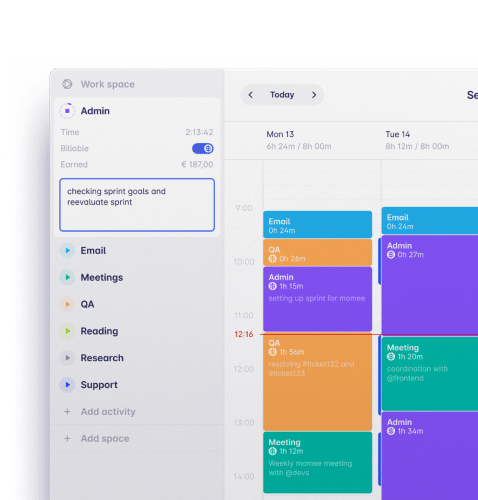How Does Remote Working Affect Productivity?
One of the most common questions nowadays is: How does remote working affect productivity? Let’s see.
Remote work has many advantages, and more than ever, employees have begun to value jobs that allow them flexibility. Many are even saying goodbye to jobs that force them to return to their pre-pandemic office life.
Today, 16% of companies worldwide are 100% remote, but a large percentage of companies still do not allow remote working.
The justifications most often given by bosses are the loss of the company’s culture and the drop in productivity of those who work from home. But does this drop in productivity even exist?
In this article, we’ll find out once and for all how remote working affects the productivity of employees.

Maximize your productivity by tracking your time
How does remote working affect productivity?
Remote working increases productivity and several studies show it.
According to ConnectSolution, 77% of remote workers say they’re more productive when working from home, with 30% doing more work in less time and 24% doing more work in the same period.
Additionally, the Avast Business 2018 Mobile Workforce Report showed that employees are more productive at home than in the office, and employee productivity is affected more when in the office.
Owl Lab’s 2021 annual report on the state of remote work also states that 90% of workers say they’re at the same productivity level — or higher — working from home compared to the office.
Finally, Future Forum’s 2022 report also shows that workers who can work from home report 4% higher productivity scores than fully in-office workers. This report also showed that schedule flexibility leads to even greater benefits. Workers with full schedule flexibility report 29% higher productivity than workers without the ability to shift their schedule. They also report a 53% greater ability to focus.
Read our blog to find out how time tracking can be an ally to your productivity.

Track your time with a physical Tracker
Build a habit using muscle memory and a powerful physical reminder. All new users get 2 months free subscription when connecting a new Tracker.
Summing up
In sum, remote work is great for productivity and performance and is here to stay. The only ones who don’t seem to agree are bosses worldwide, who keep pushing employees to return to the office.
Remember that remote working in March 2020 is not the same as remote working in 2022, and remote working isn’t only working from home. When we quarantined home with no choice, our homes were not properly prepared to become offices.
In the last two years, people have invested in quality equipment for their home offices, allowing them to have more comfortable spaces to work in.
Furniture stores got a big boost during the pandemic as millions of people turned their homes into makeshift schools and offices. IKEA stated that online sales spiked 45% during that time, driving more than 4 million visits to its website.
On the other hand, each individual has a preference regarding the environment in which he or she works. For many, the lack of conviviality in the office can be an enemy of productivity. However, the numbers speak for themselves.
How does working from home increase productivity?
Despite initial fears that we would get easily distracted at home, the data doesn’t lie: generally speaking, we’re more productive than in the office. However, despite working harder, we manage to have a better work-life balance and experience less stress. How is this possible? Here are the reasons why productivity increases when working remotely.
- Less social interactions, fewer distractions: While socializing is very important, many employees waste too much time in the office every day catching up over the coffee machine. They also take more breaks and longer lunch hours than those who work from home, resulting in lower productivity.
- There’s no commute: Commuting to and from work robs an average worker of 8.5 hours a week. By not having to commute, employees can sleep longer hours and experience less stress, which contributes to better productivity.
- Less stress: Remote workers experience less stress. They experience 1.5x less work-related stress and anxiety than office workers. At a time when many companies are reinforcing mandatory office work, the stress levels of these workers have risen again.
- More exercise: With less time wasted commuting to work and chatting by the water machine, remote workers can use their extra time for healthy practices, like exercise. As we know, physical activity is closely correlated with decreased stress and anxiety, increased productivity, and the overall maintenance of good mental health.
- Better work-life balance: By being able to spend more time with their families, exercise more, and get home earlier without having to go through the hell of end-of-day traffic, remote workers have a better work-life balance. What does this translate into? Less stress and anxiety, more happiness and productivity, and more time for hobbies that stimulate them.
TIP: Do you want to increase your productivity? Give a try to one of the best productivity planners!

Why don’t leaders believe we can be productive at home?
The main argument from those managers who don’t believe in remote working is the fear of loss of company culture when the team is not gathered in the office. However, there seems to be another clear reason — leaders can’t control people when they’re at home.
Microsoft released a report this year that demonstrates this reality. According to the data collected, 87% of employees report being productive at work. Unfortunately, only 12% of the leaders say they have complete confidence that their team is productive. Additionally, 85% of leaders say that the shift to hybrid work has made it challenging to have confidence that employees are productive.
All this data shows that there is still productivity paranoia: leaders don’t trust their employees. They believe their employees can’t be as productive at home as they would be in the office, despite all the evidence showing the opposite.
There’s one constant takeaway among hundreds of studies and testimonials since remote and hybrid working were implemented: people work more hours at home, have more meetings, and get more things done.

Maximize your productivity by tracking your time
Conclusion
Remote working is here to stay, whether leaders like it or not. Beyond an unequivocal increase in productivity proven by dozens of studies and surveys over several years, there are clear benefits for workers on a personal level.
Companies should put aside the paranoia created by the lack of control of remote workers and reap the benefits of increased worker productivity and higher satisfaction rates.
Remember: remote work isn’t just a benefit for workers and companies. After all, happy workers have higher productivity rates and are better teammates.
Additionally, employees tend to stay longer in companies that allow flexibility. Given that the employee retention rate is a huge challenge these days, this is a huge plus.
FAQ
In our blog, you’ll find that multitasking is detrimental to employee productivity, despite still being considered an essential skill by recruiters. Studies show that when multitasking, worker productivity can be reduced by 40%.
Studies show that teamwork significantly impacts organizational performance thanks to workload, responsibility sharing, and stress reduction.
Stress has a very negative effect on work productivity. Stress makes it harder to concentrate, which impairs productivity and the ability to grasp new information, as well as other adverse effects on health.
In our article, you’ll find several ways to motivate your employees to be more productive. Ensuring their well-being and happiness is crucial. Additionally, you should have a very healthy communication culture, set realistic goals, and give regular feedback on their performance and results.
There are several apps but Timeular is one of the best remote working apps because it helps individuals and teams to increase their efficiency and productivity.
You might be interested in: